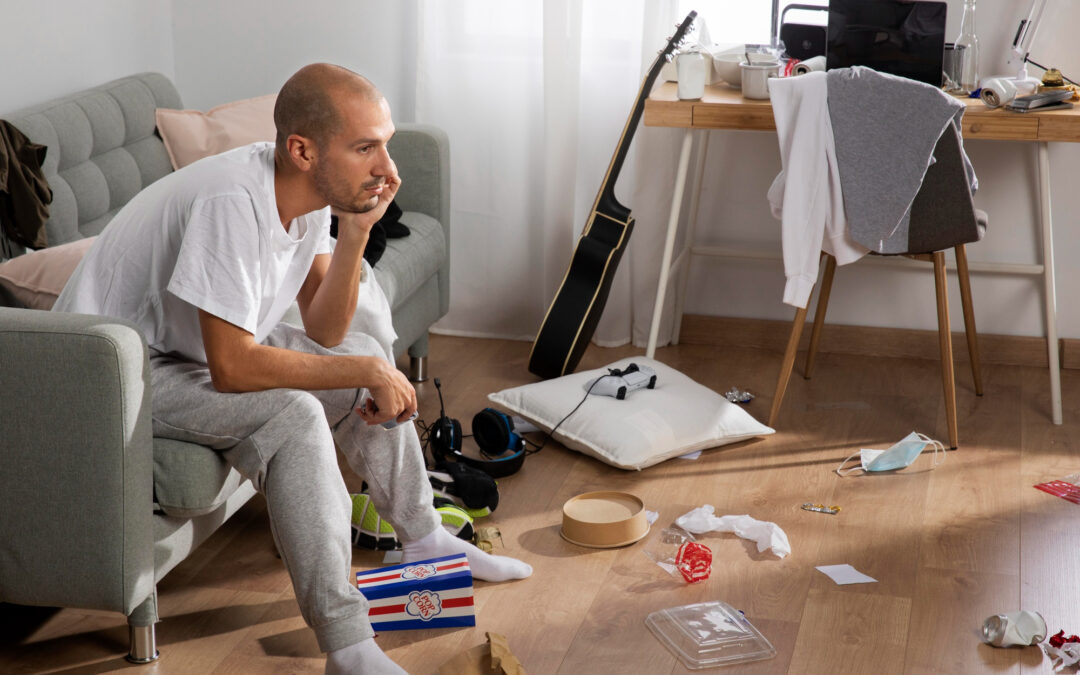If you suffer from depression, you don’t need us to tell you that disorganization is a common symptom.
It might help to hear that you’re not alone in your clutter, however. Videos featuring “depression rooms” are accruing millions of views on TikTok and YouTube, which is a clear signal that you’re not the only adult who can’t keep a tidy home. Far from it, in fact.
Clutter is common for those who suffer from depression, and a part of this has to do with the connection between disorganized spaces and deteriorating mental health. Research shows that our physical environments influence our cognition, emotions, and behaviors—and vice versa.
Your brain likes order. Disorder takes a small but constant toll on your cognitive resources, and this limits your ability to do a whole range of things: focus, connect with others, complete your work, wake up on time, etc. One day of living amidst messiness is no problem, but many days in a row can have a cumulative effect. What’s more, the impact is self-perpetuating: deteriorating mental health might create a “depression pile” which, in turn, drags you down further, leading to a “depression room,” a “depression house,” and so on. Breaking the cycle is hard but possible.
Depression and Messiness: Tidying Up Your Mental Health
It’s not easy to take proactive steps toward well-being when you’re depressed, and yet even the smallest interventions can have a dramatic impact.
KC Davis, a licensed professional counselor and author of the book, How to Keep House While Drowning breaks cleaning a depression room down into five simple categories. Every room contains just five things: trash, dishes, laundry, things with a place, and things without a place. Focus on just one of these at a time and—all of a sudden—an insurmountable task feels, well, a little more surmountable.
Another piece of advice Davis provides is to focus on function, not aesthetics. Folding laundry? Not necessary (wrinkles never hurt anyone). Doing dishes? Necessary (at least to the point where you have one clean plate, fork, and knife to eat with).
Lastly, Davis encourages readers to break themselves of an all-or-nothing mindset. You don’t need to deep clean a room to resolve clutter any more than you need to accomplish the task in a single day. Set a timer for ten minutes and tell yourself that you only need to accomplish as much as you’re able in this short time frame.
Don’t Despair if Even Simple Solutions Are Too Much
However sound Davis’ advice may be, it’s of no use if your depression is more than you can manage.
Nearly a third of people with depression struggle to find relief from any sort of treatment. If you’re among this large minority, you need not feel bad about living in a cluttered “depression room.” After all, household tasks are hard for anyone with a severe illness, and treatment-resistant depression is a severe illness.
Luckily, hope is on the horizon. Ketamine infusion therapy is a proven treatment for depression, alleviating symptoms in up to 70% of patients—even those who have failed to find relief through talk therapy, medications, and other depression treatments.
Contact Vitalitas Denver
To learn more do not hesitate to Contact Vitalitas Denver—Our Colorado area ketamine clinics are staffed by qualified and experienced medical professionals. We are here to help you find hope.


